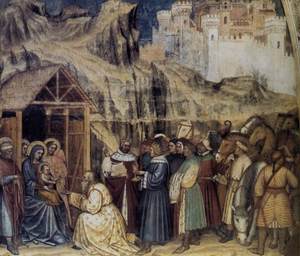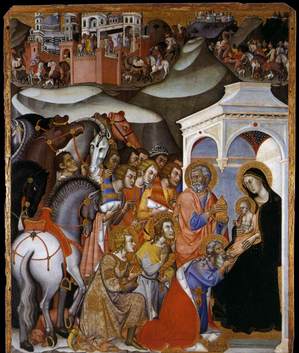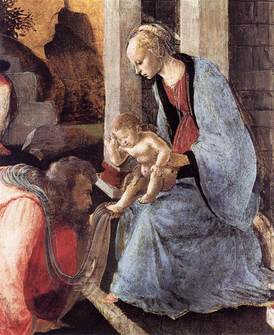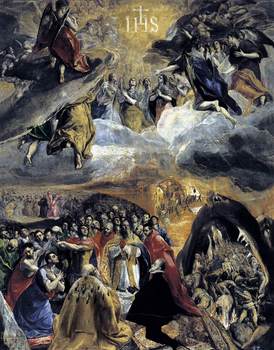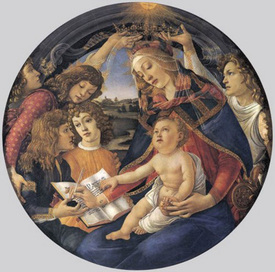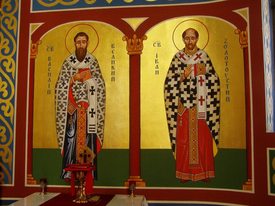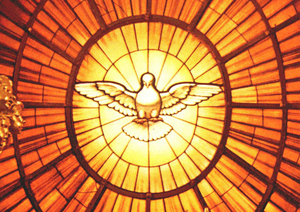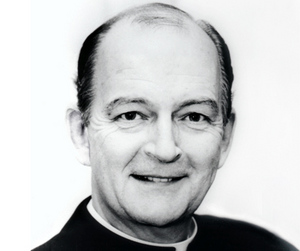On December 19th I brought to our attention a recently published book about Communion in the hand by Bishop Schneider. You can read the entry here. As a follow-up, here is a bulletin note from a Connecticut pastor raising the question of the fittingness of the faithful’s reception of Holy Communion in the hand. The argument is cogent.
The beginning of each year is often a time of “New Year Resolutions”. Over the next few weeks in this Pastor’s Column I would like to suggest some “New Year Resolutions” having to do with our Catholic Faith. My first suggestion is during 2009 start exercising the option of receiving Holy Communion on the tongue in Mass. Let me explain why.
This past summer Catholics were horrified when a professor at the University of Minnesota willfully desecrated the Eucharist. On the internet Professor Paul Zachary Myers invited anyone to obtain for him a consecrated Host from a Catholic Church so that he could desecrate It. Another man read about the request and took a Host from the London Oratory, videotaping Himself taking It from the Mass. He then sent the Host to Professor Myers and posted the video on the internet. Professor Myer then proceeded to drive a rusty nail through the Host in order to show the “absurdity” of the Catholic belief in the True Presence, and posted photos of the event on his website. Unfortunately the event set off a series of copycat crimes, and these desecrations are all over the internet.
What can be behind so much hatred? Even a child understands that it is not right to mock what others hold to be sacred. I have offered Mass in reparation for this sacrilege, and I know that many good Catholics have also done forms of prayer and penance in order to console the wounded heart of Our Lord.
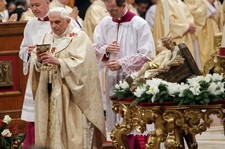 Do you remember last year here at St. Mary’s when we found a Host under one of the pews in the church? I know from other priests that this happens every once in a while in other parishes as well. These incidents remind us that it would certainly be more difficult for people to take the Host improperly if everyone were receiving Holy Communion on the tongue. As the Catholic Church teaches, “If there is a risk of profanation, then Holy Communion should not be given in the hand to the faithful” (Redemptionis Sacramentum, 92).
Do you remember last year here at St. Mary’s when we found a Host under one of the pews in the church? I know from other priests that this happens every once in a while in other parishes as well. These incidents remind us that it would certainly be more difficult for people to take the Host improperly if everyone were receiving Holy Communion on the tongue. As the Catholic Church teaches, “If there is a risk of profanation, then Holy Communion should not be given in the hand to the faithful” (Redemptionis Sacramentum, 92).
Many people born prior to the Second Vatican Council will remember when everyone received Holy Communion on the tongue and kneeling. This has been the long held practice for thousands of years (although during certain periods of the early Church it did allow Communion in the hand). While many think that it was Vatican II that called for this change, it is important to note: Vatican II never called for Communion in the hand. Communion in the hand was the result of disobedience which forced the hand of the Church (no pun intended!).
After the Second Vatican Council some dioceses in the world started to make their own rules about receiving the Communion in the hand, disobeying the laws of the universal Church. Witnessing this practice without approval, the Vatican stated that it feared that this disobedience would lead to “…both the possibility of a lessening of reverence toward the august sacrament of the altar, its profanation, and the watering down of the true doctrine of the Eucharist” (Memoriale Domini).
Therefore in 1968 Pope Paul VI graciously sent out a questionnaire to all the bishops of the world asking if there should be a prudent change in the Church’s practice on how Communion would be distributed. The poll numbers came back overwhelming against Communion in the hand. Hence the Vatican concluded: “The answers given show that by far the greater number of bishops think that the discipline currently in force should not be changed. And if it were to be changed, it would be an offense to the sensibilities and spiritual outlook of these bishops and a great many of the faithful” (Memoriale Domini).
Nonetheless the disobedience continued and some of these dioceses petitioned Rome to officially permit Communion in the hand. A year later, in 1969, Pope Paul VI gave an indult to the French bishops permitting each bishop to decide the question in his own diocese (En réponse a la Demande). An indult is a special permission for a particular situation, rather than a universal norm. Nonetheless eventually the majority of dioceses in the world took advantage of the indult and simply permitted the practice.
Why did the Pope allow it? Perhaps it can be best summed up by the words of Our Lord about why divorce was allowed in the Old Testament: “For your hardness of heart Moses allowed you to divorce your wives” (Matthew 19:8). Their disobedience had reached such a point that it would have been difficult to have them return to the traditional practice.
Nonetheless some countries like Sri Lanka did not use the indult, and maintained the long held tradition of receiving only on the tongue. Recently there have also been dioceses around the world such San Luis, Argentina and Lima, Peru that have returned to the traditional practice and no longer permit Communion in the hand. This is an option fully supported by the Congregation of the Doctrine of the Faith.
Furthermore, if one does receive Communion on the hand, there is always the danger that particles may be remain in the hand. The Council of Trent infallibly teaches that Our Blessed Lord is truly present even in the particles as well: “If anyone denies that in the venerable sacrament of the Eucharist the whole Christ is contained under each form and under every part of each form when separated, let him be anathema” (Chapter VIII, Canon 3). For this reason the priest always purifies his hands of particles at the end of Mass, and uses a corporal (a small white cloth meant to catch the corpus, or body, of Our Lord).
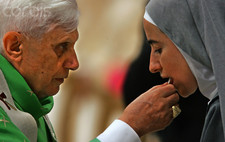 Finally another major event occurred this past year when Pope Benedict XVI asked that from now on, all who receive Holy Communion from him must receive It on the tongue and kneeling. I am sure that by insisting on this ancient practice the Pope is trying to foster a deeper respect for the Eucharist as well.
Finally another major event occurred this past year when Pope Benedict XVI asked that from now on, all who receive Holy Communion from him must receive It on the tongue and kneeling. I am sure that by insisting on this ancient practice the Pope is trying to foster a deeper respect for the Eucharist as well.
When Rome did give the indult to the French bishops in 1969 it stated, “The new manner of giving Communion must not be imposed in a way that would exclude the traditional practice.” Therefore Communion is on the tongue is still the common practice for the universal Church. While both practices are permitted in the diocese of Bridgeport, I encourage parishioners to give prayerful consideration to following Pope Benedict XVI’s lead by receiving Holy Communion on the tongue in the new year.
Sincerely in Christ,
Father Greg J. Markey, Pastor
Saint Mary’s Church, Norwalk, CT
